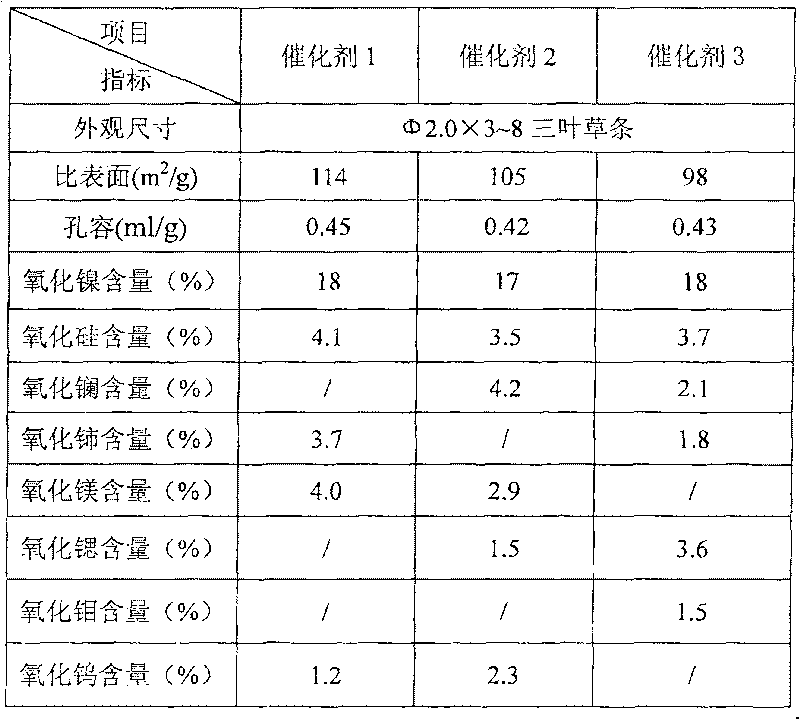Full-cut fraction pyrolysis gasoline diolefin selective hydrogenation method
A pyrolysis gasoline and selective hydrogenation technology, which is applied in the field of selective hydrogenation treatment of low- and medium-distillate oils, can solve the problems of hydrogenation load and poor hydrogenation stability, and achieve good hydrogenation stability, strong resistance to impurities and The effect of anti-gelatin ability and excellent hydrogenation stability
- Summary
- Abstract
- Description
- Claims
- Application Information
AI Technical Summary
Problems solved by technology
Method used
Image
Examples
preparation example Construction
[0026] The preparation of catalyst 1~3:
[0027] Add 140ml of water, 5ml of nitric acid (content 60%), silica sol (containing 40% silicon dioxide) to 300g of pseudo-boehmite alumina powder, knead and extrude into strips, dry in the air at 120°C, 350~ Baking at 560°C for 3 to 6 hours. Take 100g of the roasted carrier, then dissolve magnesium nitrate and / or strontium nitrate in water according to the required amount, impregnate it on the carrier, dry it in the air at 120°C, and roast it at 800-1100°C to obtain the corresponding modified Al 2 o 3 carrier.
[0028] Add nickel nitrate to 20ml~30ml water and stir to dissolve, add cerium and / or lanthanum, soluble salt of VIB element while stirring according to the required amount, adjust the pH value to 4, then impregnate on 10g carrier, and age for 12 hours, Dry at 120°C and calcinate at 400°C for 4 hours to prepare the catalyst. The physical and chemical properties of the catalysts obtained can be shown in Table 2.
[0029] T...
Embodiment 1
[0032] Put catalyst 1 into a 100ml adiabatic bed hydrogenation reactor, raise the temperature of the bed to 240°C at a rate of 50°C / h under the pressure of 0.5MPa and maintain it for 5h, then raise the temperature to 360°C at a rate of 10°C / h ℃, maintained for 10h, and then raised to 410℃ at a rate of 15℃ / h, maintained for 5h; then cooled to 50℃, put into cyclohexane containing 1000ppm dimethyl disulfide, and continued to operate for 3h. with C 5 ~C 9 Whole distillate oil is used as raw material, reaction pressure: 2.8MPa, inlet temperature: 60°C, space velocity of fresh raw material oil: 3h -1 , Hydrogen to oil volume ratio: 200:1 (volume ratio is based on fresh oil) and run for 200h. The average diene of the hydrogenation product within 200 hours is 0.82 g iodine / 100 g oil, and the iodine value is 35.6 g iodine / 100 g oil.
Embodiment 2
[0034] Put catalyst 1 into a 100ml adiabatic bed hydrogenation reactor, raise the temperature of the bed to 260°C at a rate of 65°C / h under the pressure of 0.5MPa and maintain it for 6h, then raise the temperature to 350°C at a rate of 12°C / h ℃, maintained for 11h, then raised the temperature to 390°C at a rate of 12°C / h, and maintained for 4h; then cooled to 60°C, put in cyclohexane containing 2000ppm dimethyl disulfide, and continued to operate for 2h. with C 5 ~C 9 Whole distillate oil is used as raw material, reaction pressure: 2.8MPa, inlet temperature: 70°C, space velocity of fresh raw material oil: 2.8h -1 , Hydrogen to oil volume ratio: 200:1 (volume ratio is based on fresh oil) and run for 400h. The average diene of the hydrogenation product within 400 hours is 0.81 g iodine / 100 g oil, and the iodine value is 36.9 g iodine / 100 g oil.
PUM
| Property | Measurement | Unit |
|---|---|---|
| specific surface area | aaaaa | aaaaa |
| specific surface area | aaaaa | aaaaa |
| olefinic | aaaaa | aaaaa |
Abstract
Description
Claims
Application Information
 Login to View More
Login to View More - R&D
- Intellectual Property
- Life Sciences
- Materials
- Tech Scout
- Unparalleled Data Quality
- Higher Quality Content
- 60% Fewer Hallucinations
Browse by: Latest US Patents, China's latest patents, Technical Efficacy Thesaurus, Application Domain, Technology Topic, Popular Technical Reports.
© 2025 PatSnap. All rights reserved.Legal|Privacy policy|Modern Slavery Act Transparency Statement|Sitemap|About US| Contact US: help@patsnap.com


